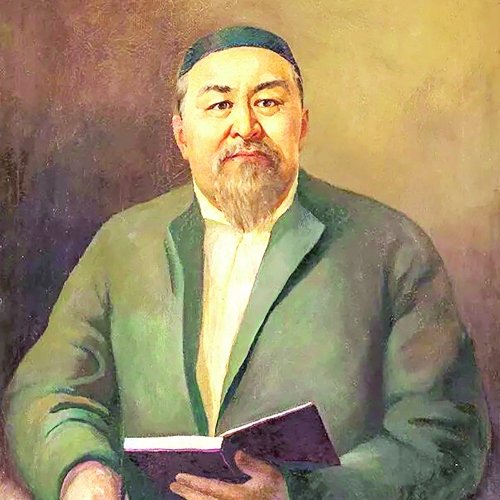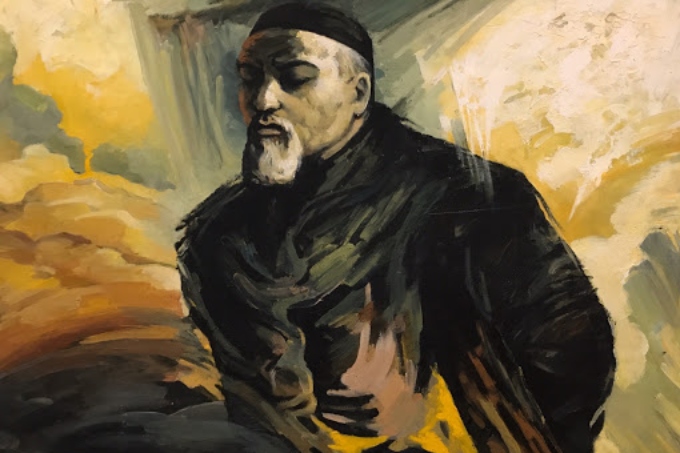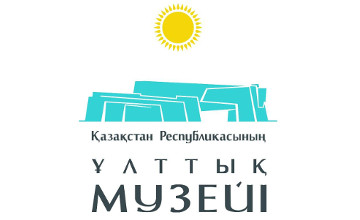Abai Kunanbaev is the Shakesphere of Kazakh literature. His Book of Words, «Kara Sozder», created by the great thinker constitute an ethnic philosophical work. This creation of his is an exploration of Kazakh national life in the second half of the 19th century. He influenced social affairs in the country where he lived.
One day the great philosopher Socrates started a conversation with a scientist Aristodim, his student, about the people’s divine service to Almighty God. Aristodim did not recognize God and laughed at those who worshiped the Lord's will.
- Hey, Aristodim, are there any people causing your admiration for their creations?-Socrates asked his student.
- As much as you want, revered teacher - he replied.
- Name me at least one of them.
- I admire the grandeur of the poetry of Homer, the tragedies of Sophocles, or rather his art to transform and understand the state of mind of others, the paintings of Zeuxis. He named a few more gifted men, whose names were widely known at that time among the people.
And again Socrates asked him:
- If so, who is more worthy of admiration: God, who created human beings, making them the crown of all living and sentient, or artist, who creates though with a unique skill, but nevertheless only the lifeless kind of person?
- Almighty - said Aristodim. - But this is true only when we are not dealing with the random of his creations, but with those of them that he created reasonable.
- But people know a lot of useful things, there are a lot of different situations in the life, there occur understandable and unexplained phenomena in the nature, -replied Socrates. -What is still more surprising, Aristodim: those things, situations and phenomena, meaning and usefulness of which are not covered by a veil of obscurity or vice versa?
- I think the only reasonable thing is that, which was created for man's benefit, -replied Aristodim.
- Well. You will agree, of course, with the fact that the peak of the creations of God is the man. But didn’t the Creator endow him with five senses, being completely assured in their necessity for a man? Can you find in man casual, unreasonable organs?
For example, we have eyes to see. If we did not have them, how could we admire the beauty of the world? The eyes are gentle, and in order to save them we have eyelids: they open and close the eye when it is necessary. Eyelashes protect the eyes from the wind and the motes, and eyebrows put away the sweat trickling down from the forehead.
If there were no ears, the man would not hear either noise, or rumble, wouldn’t keep his ears open against rustle or cry, and would not enjoy the sounds of the songs or melodies. If the nose did not feel smells, a man would not like the incenses and would not run from the stench. He would not care.
Finally, if a person didn’t have the palate and the tongue he could not taste the sweetness or bitterness of food. Is all this not good for the mankind? The eyes and nose are located near the mouth to see the purity and to feel the smell of the food. Other holes, spewing dregs of the body and however, necessary for the body, are located away from the head, from the noble organs of knowledge. Is it possible to say that all this is the accidental manifestation of the mind of Creator?
Aristodim thought and then he admitted that Creator of the world has the highest wisdom. Aristodim didn’t doubt any more that the Almighty created man with love.
- Think Aristodim – continued Socrates. - All living things love their babies, do not leave them to their fate, but protect and grow. All living things multiply - this is the basic condition of life, because it is the only way to confront death. Do not these aspirations of living beings say that God created them lovingly? Love, as you see, is also given by the Almighty.
- Hey, Aristodim! How can you assume that the mind is only yours, a man’s, domain? Is the human body not like a grain of sand of the land on which he walks? Does the sweat, which is released from the human body, differ from the Earth's water drops? So where did you take a special mind? I know how you will answer: "First – you’ll tell - there was a soul and then came the mind." And here you have a soul and a mind. What is of it? You saw the world and made sure that everything in it is created advisable and everything fits and obeys certain laws. But you were not able to reach the immensity of the world. You're amazed with the majesty and the inaccessibility of its truth just because your mind is small. That's why you try to learn it. So how did it arise? What lies at its source? Does it the atom or some kind of intelligence, as boundless as its creation? You can exclude the mind. But even then, this world, not accessible to any measures or calculations, arose not spontaneously, but as a natural movement of life, not by itself, but for the possibility to live in it. And all the relationships in the world must be subordinated to the incredible laws of beautiful.
- Everything you’ve told me is the truth - said the scientist. - I repeat that I agree with the fact that the Creator is the bearer of a higher intelligence. I have no idea to doubt his greatness, but why he, the Almighty, needs my service to him in my prayers?
- You're wrong, Aristodim. He does not need your prayers. But you are a debtor, as he takes care of you.
- How do I know that he cares about me?
- Look at all the animals and look at yourself! - exclaimed Socrates. - Life is given to everyone. But are all living creatures given the warmth of the soul, spirituality and enlightenment? A man proposes the future, tries to comprehend the real days of his life, and thinks about his experiences. An animal vaguely understands his past and present, and it does not understand the future at all. Look how difficult are the people and what are the animals? A man leans on two legs and grows straight up: he can see the whole world, can make sense of it, can command the animals, and subordinate them. The animals are not able to use consciously the power of other creatures: some animals rely on their quick feet, others - on strong wings. Nothing good would have happened if a person didn’t believe in himself or his body was like the body of an animal. And exactly the same nonsense would be if the animal had a human mind, because the body of the animal and its physical organization do not comply with the spiritual manifestation of the mind, do not correspond to the purpose of understanding of art, learning medicine, mastering of science. Where would, for example, the ox build a great city, make the tools, forge the weapons of war? How will he do this? Even if he will be given an exceptional mind, where the ox will take the necessary skill and dexterity? A man is the only who has the extraordinary power - intelligence, amazingly proportioned body and this combination determines his versatility and high talent. Is a man not the king of all living creatures on the earth? And if he is the supreme creation of God, doesn't it mean that a man was awarded his love? How can a person, even if he is the greatest scientist on the earth, how can the human race not to be grateful to the Creator and not to consider themselves to be his eternal debtors?-ended Socrates.















